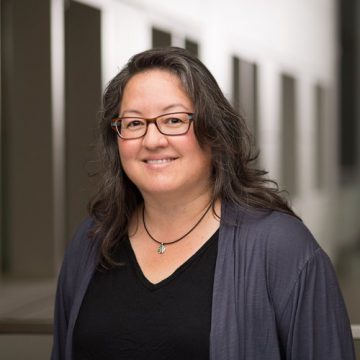For the past seven years, Geisel researcher Anna M. Adachi-Mejia, PhD TDI ’02, has been putting cameras in the hands of people of all ages to share their point of view—whether to reveal middle school students’ approaches to healthy eating, high school students’ ideas about healthy sleep patterns, or older adults’ experiences about physical activity— through a process called photovoice.
Using photovoice to measure human behavior and related health outcomes, her multidisciplinary studies focus on understanding how a rural community’s infrastructure contributes to health behaviors.

Photovoice relies on the power of images to spark conversation and community empowerment. With research-specific questions in mind, study participants are asked to consider those questions while documenting their lives and describe in their own words what they photographed and why. Through collaboratively discussing the photographs, the narratives can be further developed to help policymakers craft solutions that address critical community needs.
Recognizing that people have different strengths, Adachi-Mejia also encourages people to share their voice through writing or the spoken word if they prefer. Her latest study explores the challenges and success of aging in southern New Hampshire’s Hispanic/Latino, Black/African-American, and Bhutanese communities.
“The major goal of this study is to promote understanding about aging in communities of color and those of language minorities,” says Adachi-Mejia who is director of the Health Promotion Research Center at Dartmouth and an associate professor of community and family medicine at Geisel. “Historically, these communities haven’t had an opportunity to share their views.
“What’s nice about using pictures to convey their perspective is that language or literacy barriers disappear through the magic of photography,” she notes. “Photovoice is a tool that can be used to explore any topic with groups who are not accustomed to being asked to share their viewpoint.”
Photovoice Poster Gallery
Last summer, before arming study participants with digital cameras, she asked them to think about the aging process and to reflect on what is going well for them, challenges, and what they would like help with. Adachi-Mejia scrupulously avoids giving examples of what she is expecting to see because she believes it contaminates creative thinking. “As a facilitator, you have to feel comfortable with uncertainty—you don’t know what the participant will share. There are no ‘right’ or ‘wrong’ answers. The focus of the attention is about the participant, not the facilitator.”
The photos and narratives revealed an array of issues—challenges in accessing public transportation, the importance of community building, the joy of interacting with people of all ages, and the need to plan for purpose while aging, such as volunteering at a food pantry or helping to shape the future through working with youth. The important role spirituality and religion play in their lives along with ways to remain creative and physically active is a common thread. Gardening, for example, is popular both for its connection to spiritual practice and for growing food. “There are many community gardens and programs that promote gardening,” Adachi-Mejia says. “How do we make sure everyone who wants to garden is connected to those programs? How do we break down barriers to access?”
This spring and summer, Adachi-Mejia and her collaborators will disseminate the results of the photovoice project and translate their findings with the long-term goal of informing interventions to promote healthy living in healthy environments statewide.
“Older adults in the study clearly want to be connected with each other and with the broader community. They have so much energy and have many gifts to share. Through our community partners we hope to facilitate making new connections so older adults can share their talents,” Adachi-Mejia says. “Even though this work is just the beginning, where we have planted the seeds of interest, we have already experienced a groundswell of enthusiasm from other community groups that want to do this work.”
This project is funded by a grant from the New Hampshire-based Endowment for Health, a foundation dedicated to creating a culture “that supports the physical, mental, and social wellbeing of all people” through all stages of life. Project collaborators include partnerships with a variety of regional organizations with a shared goal of promoting the health, independence, and dignity of older adults, including the Alliance for Healthy Aging and the New Hampshire Health and Equity Partnership.